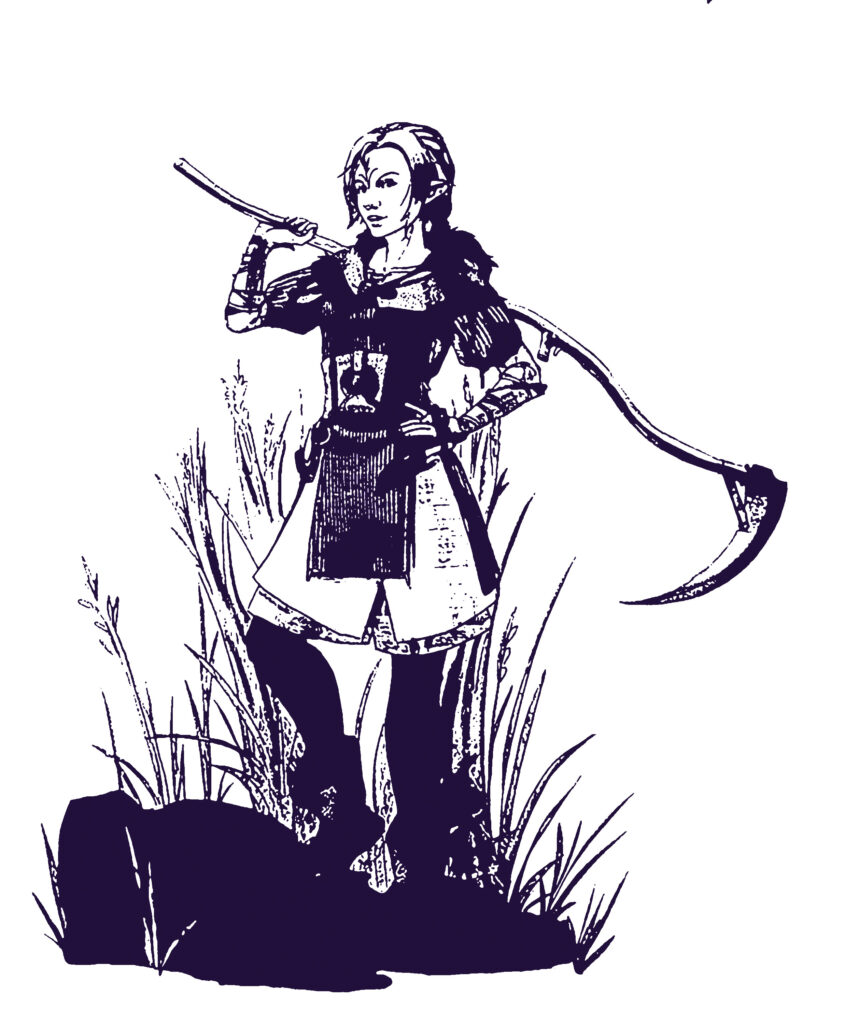“Creativity is piercing the mundane to find the marvelous.”
— Bill Moyers
 Most Fantasy Trip players — and most gamers in general — try to make their characters are effective as possible, tweaking their options and choices to maximize their capabilities. This leaves little room for background talents that could make your characters more interesting.
Most Fantasy Trip players — and most gamers in general — try to make their characters are effective as possible, tweaking their options and choices to maximize their capabilities. This leaves little room for background talents that could make your characters more interesting.
At the very least, mundane skills can give a figure familiarity with the tools and activities of their profession and give them a bonus when dealing with those of similar trades. They should have the required tools to perform their jobs. But what if your past job experience could be applied to your new labyrinth-crawling career?
Note that these mundane abilities are no substitute for talents that make one better at a trade. A farmer with animal handling and driver would be much more efficient and a musician with the bard talent would probably be able to sway much larger audiences, but this is just an attempt to add practical value to an otherwise flavorful character choice.
Farmer or Gardener. Cidri is filled with pests and invasive plant life. Knowing what is dangerous to your crops is critical. These agriculturists could get 4/IQ test to recognize plants like bloodtrees or am bushes before getting in range of them, and might even know how to dispose of them. They would also be able to tell if an area is wild growth or being cultivated.
Beekeeper or Butcher. These animal processors can recognize which parts of a creature (or its output) are edible and be able to gauge its quality. They might (determined by the GM) be able to assess strange creatures as well.
Carpenter, Joiner, Mason, or Miner. Knowledge of construction would help them recognize dangers in their professional environments like faulty supports or loose boards. They might be able to spot built-in traps (at one less die) as well.
Fisherman. Depending on their background, they would be familiar with preferred fishing methods — nets, traps, or even poles and spears. They should be able to recognize common dangers like weather or large predators and be able to feed themselves and their companions from the waters.
Handyman. This is a jack-of-all-trades. They would be comfortable with a broad set of tools and would be able to remove traps at an additional die. A handyman should be able to copy most one-point mundane repairs with a slight penalty.
Scribe or Calligrapher. Even without Literacy, a copying scribe would be able to determine the language of written communication and maybe puzzle out its purpose. A literate scribe would have basic knowledge of the documents they are most familiar with — business contracts, administrative decrees, or even nobles’ correspondence.
Tailor. Beyond knowing materials and the basics of cutting and stitching, this skill involves an understanding of fashion and trends. They could be able to recognize outsiders by their garments or notice cheap embellishments or worn-out attire. A skilled tailor might be able to notice objects hidden in clothing or unseen pockets.
Tanner. In addition to understanding the process and materials of curing hides, a skilled tanner would also have knowledge of which creatures’ hides can be successfully cured and what exterior parts might have value on the open market.
Leatherworker, Potter, Weaver, or Woodcarver. Like the construction workers above, these craftsmen could notice weak construction or hidden traps in the items they are familiar with. They should also be able to note the quality and value of their trades’ objects.
Administrator, Herald, or Lawyer. All of these careers involve persons of power. They would need to know how to act among them and would gain an understanding of their motivations. They might have passable courtly graces or a basic understanding of diplomacy, or at least be able to fake it for a short period.
Brewer, Cook, or Vintner. These are culinary professionals beyond mere scullery maids. They know their products and understand their customers’ tastes. They should be able to gauge the quality and value of goods and detect spoiled or adulterated samples. They may also have knowledge of how to disguise spoilage or poisons.
Artist, Jeweler, Musician, or Sculptor. These careers are as much about knowing your patrons as knowing your craft. While they would recognize quality and note substitutions or fakes in creations, they would have similar notions about their clients. They might gain some skill at courtly graces, carousing, or even detecting lies along with their artistic pursuits.
Strangely, very few of these career talents are reflected in the Table of Jobs (ITL, p.58). I would suggest they are all 3/18 Risk, and one-point mundane talents pay $5/week, two-point talents pay $20, and three-point talents pay $50. Mastery in any talent triples the weekly pay.
How have you used mundane skills in your games? What other values do you think they could provide? Let us know in the comments below.

When I GM, I make all Mundane Talents cost 1 point and give players the choice of one Mundane Talent or one language for free at character generation. Characters who work their Mundane Talent into play are likely to enjoy higher XP awards.
When I’m playing a PC, I pick a Mundane Talent to flesh out my character. For example, I play a bard who plays concertina has Mundane Talent: Dancer. When describing his actions in combat, I’ll describe him as pirouetting to avoid an attack or gracefully dancing around an opponent or using fancy footwork to fake them out.